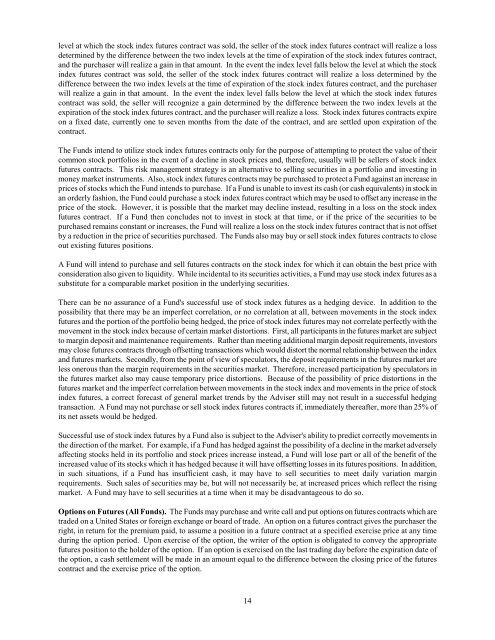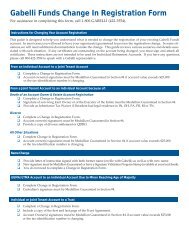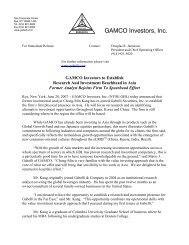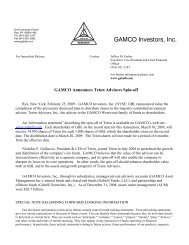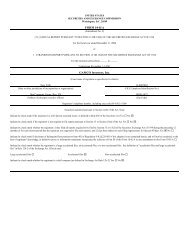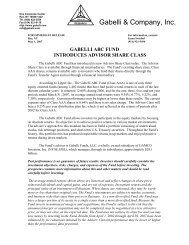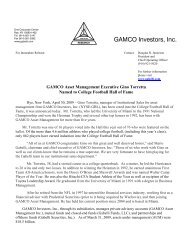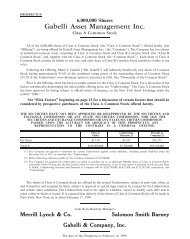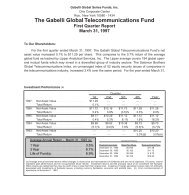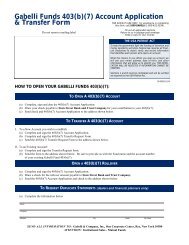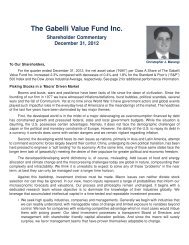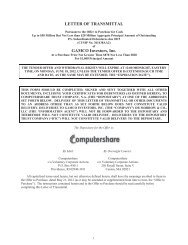Statement of Additional Info - Gabelli
Statement of Additional Info - Gabelli
Statement of Additional Info - Gabelli
Create successful ePaper yourself
Turn your PDF publications into a flip-book with our unique Google optimized e-Paper software.
level at which the stock index futures contract was sold, the seller <strong>of</strong> the stock index futures contract will realize a loss<br />
determined by the difference between the two index levels at the time <strong>of</strong> expiration <strong>of</strong> the stock index futures contract,<br />
and the purchaser will realize a gain in that amount. In the event the index level falls below the level at which the stock<br />
index futures contract was sold, the seller <strong>of</strong> the stock index futures contract will realize a loss determined by the<br />
difference between the two index levels at the time <strong>of</strong> expiration <strong>of</strong> the stock index futures contract, and the purchaser<br />
will realize a gain in that amount. In the event the index level falls below the level at which the stock index futures<br />
contract was sold, the seller will recognize a gain determined by the difference between the two index levels at the<br />
expiration <strong>of</strong> the stock index futures contract, and the purchaser will realize a loss. Stock index futures contracts expire<br />
on a fixed date, currently one to seven months from the date <strong>of</strong> the contract, and are settled upon expiration <strong>of</strong> the<br />
contract.<br />
The Funds intend to utilize stock index futures contracts only for the purpose <strong>of</strong> attempting to protect the value <strong>of</strong> their<br />
common stock portfolios in the event <strong>of</strong> a decline in stock prices and, therefore, usually will be sellers <strong>of</strong> stock index<br />
futures contracts. This risk management strategy is an alternative to selling securities in a portfolio and investing in<br />
money market instruments. Also, stock index futures contracts may be purchased to protect a Fund against an increase in<br />
prices <strong>of</strong> stocks which the Fund intends to purchase. If a Fund is unable to invest its cash (or cash equivalents) in stock in<br />
an orderly fashion, the Fund could purchase a stock index futures contract which may be used to <strong>of</strong>fset any increase in the<br />
price <strong>of</strong> the stock. However, it is possible that the market may decline instead, resulting in a loss on the stock index<br />
futures contract. If a Fund then concludes not to invest in stock at that time, or if the price <strong>of</strong> the securities to be<br />
purchased remains constant or increases, the Fund will realize a loss on the stock index futures contract that is not <strong>of</strong>fset<br />
by a reduction in the price <strong>of</strong> securities purchased. The Funds also may buy or sell stock index futures contracts to close<br />
out existing futures positions.<br />
A Fund will intend to purchase and sell futures contracts on the stock index for which it can obtain the best price with<br />
consideration also given to liquidity. While incidental to its securities activities, a Fund may use stock index futures as a<br />
substitute for a comparable market position in the underlying securities.<br />
There can be no assurance <strong>of</strong> a Fund's successful use <strong>of</strong> stock index futures as a hedging device. In addition to the<br />
possibility that there may be an imperfect correlation, or no correlation at all, between movements in the stock index<br />
futures and the portion <strong>of</strong> the portfolio being hedged, the price <strong>of</strong> stock index futures may not correlate perfectly with the<br />
movement in the stock index because <strong>of</strong> certain market distortions. First, all participants in the futures market are subject<br />
to margin deposit and maintenance requirements. Rather than meeting additional margin deposit requirements, investors<br />
may close futures contracts through <strong>of</strong>fsetting transactions which would distort the normal relationship between the index<br />
and futures markets. Secondly, from the point <strong>of</strong> view <strong>of</strong> speculators, the deposit requirements in the futures market are<br />
less onerous than the margin requirements in the securities market. Therefore, increased participation by speculators in<br />
the futures market also may cause temporary price distortions. Because <strong>of</strong> the possibility <strong>of</strong> price distortions in the<br />
futures market and the imperfect correlation between movements in the stock index and movements in the price <strong>of</strong> stock<br />
index futures, a correct forecast <strong>of</strong> general market trends by the Adviser still may not result in a successful hedging<br />
transaction. A Fund may not purchase or sell stock index futures contracts if, immediately thereafter, more than 25% <strong>of</strong><br />
its net assets would be hedged.<br />
Successful use <strong>of</strong> stock index futures by a Fund also is subject to the Adviser's ability to predict correctly movements in<br />
the direction <strong>of</strong> the market. For example, if a Fund has hedged against the possibility <strong>of</strong> a decline in the market adversely<br />
affecting stocks held in its portfolio and stock prices increase instead, a Fund will lose part or all <strong>of</strong> the benefit <strong>of</strong> the<br />
increased value <strong>of</strong> its stocks which it has hedged because it will have <strong>of</strong>fsetting losses in its futures positions. In addition,<br />
in such situations, if a Fund has insufficient cash, it may have to sell securities to meet daily variation margin<br />
requirements. Such sales <strong>of</strong> securities may be, but will not necessarily be, at increased prices which reflect the rising<br />
market. A Fund may have to sell securities at a time when it may be disadvantageous to do so.<br />
Options on Futures (All Funds). The Funds may purchase and write call and put options on futures contracts which are<br />
traded on a United States or foreign exchange or board <strong>of</strong> trade. An option on a futures contract gives the purchaser the<br />
right, in return for the premium paid, to assume a position in a future contract at a specified exercise price at any time<br />
during the option period. Upon exercise <strong>of</strong> the option, the writer <strong>of</strong> the option is obligated to convey the appropriate<br />
futures position to the holder <strong>of</strong> the option. If an option is exercised on the last trading day before the expiration date <strong>of</strong><br />
the option, a cash settlement will be made in an amount equal to the difference between the closing price <strong>of</strong> the futures<br />
contract and the exercise price <strong>of</strong> the option.<br />
14


